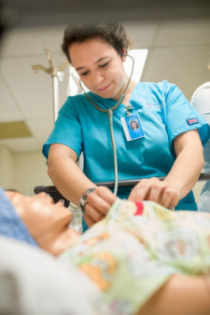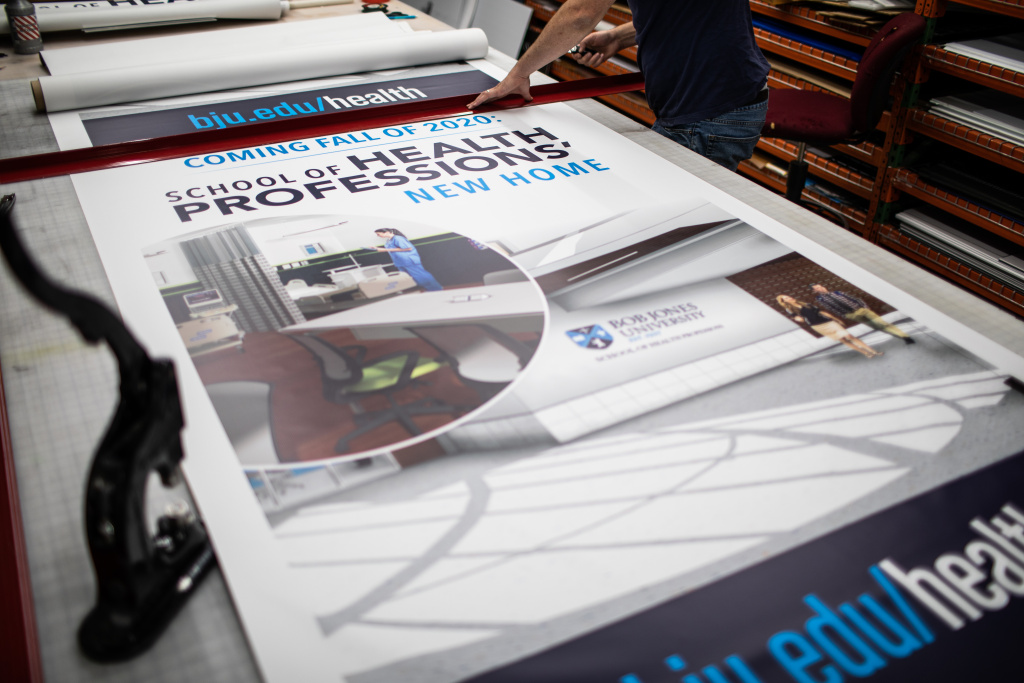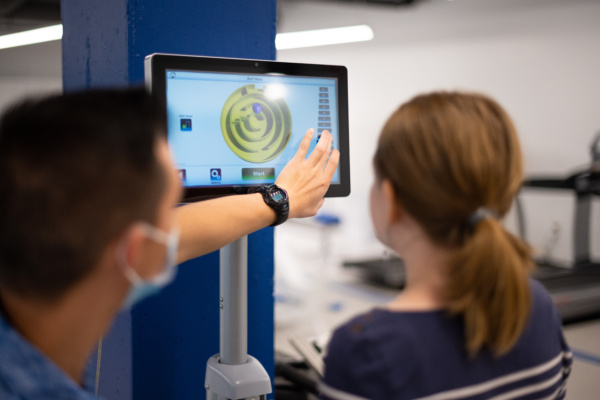Interprofessional collaboration and creating a learning environment similar to the health care workplace will be among the benefits of co-locating School of Health Professions programs in the current library building by the fall of 2020.
The BJU Board of Trustees recently approved the plan, which includes a capital campaign to renovate the first floor of Mack Library. Work has begun to consolidate and move the library to the second floor, which will be followed by bringing the building into compliance with new occupancy codes.
Included in the architect’s floor plan is a multiple-bed simulated hospital floor/multidisciplinary workspaces; labs for communication disorders, nursing skills, fitness, wellness and human performance; classrooms; faculty offices and a lounge.
Programs in the School of Health Professions include:
- Division of Exercise & Sport Science: Exercise science bachelor of science with concentrations in applied physiology and fitness and wellness; sports management bachelor of science; health and fitness associate of science.
- Division of Nursing: Nursing bachelor of science.
- Division of Health Sciences: Bachelor of science programs in premed/predent; communication disorders; health sciences with general concentration as well as concentrations in pre‐physician assistant, pre‐physical therapy, pre‐nutrition, pre‐pharmacy, public health/global health and health care administration.
Roles and responsibilities expanding
Dr. Deborah Hutcheon, a BJU graduate and member of the School of Health Professions advisory board, said bringing together SHP programs under one roof will support cross-disciplinary experiential learning.
 “This environment will allow students to interface with their peers, the faculty and their professional areas of expertise in a team-based manner that mimics real-world practice,” said Hutcheon, a registered dietitian and assistant professor in the Department of Clinical and Preventive Nutritional Sciences at Rutgers University.
“This environment will allow students to interface with their peers, the faculty and their professional areas of expertise in a team-based manner that mimics real-world practice,” said Hutcheon, a registered dietitian and assistant professor in the Department of Clinical and Preventive Nutritional Sciences at Rutgers University.
“Health care is moving away from traditional professional roles and responsibilities where, for example, nurses only perform nursing tasks or dentists only address dental care. Roles and responsibilities are expanding to where nurses may work in health care technology and dentists may conduct nutrition screening and provide basic nutrition education to patients.
“A School of Health Professions building will provide the venue for educating students for the future of health care.”
An RN to BSN online program was added in January and BJU is planning for additional online and resident programs, particularly at the graduate level.
“Historically, Bob Jones University has been more focused on seminary training or the fine arts area or the educational areas,” Hutcheon said during a career advice session with students in March. “I think this will help propel the University forward in a new area and a new market for students, and even (open) a new ministry area for students as they’re going out.”
In-Demand Occupations
The demand for qualified health professionals is growing—and the need for Christian health professionals is even greater. Health care occupations overall are expected to grow 19 percent by 2024—outpacing all other occupations, according to the U.S. Bureau of Labor Statistics. The South Carolina Office for Healthcare Workforce projects a shortage of more than 6,000 nurses over the next decade.
BJU has seen back-to-back enrollment growth of 13% in SHP programs and another double-digit enrollment increase is projected in the incoming class.
“I think that BJU and specifically the School of Health Professions has prepared me beyond most schools prepare students,” said Christopher Brantley, a 2019 Division of Health Sciences graduate who accepted a position as an exercise physiologist in Greenville. “The knowledge I have gained has directly affected my future success in the health care field. BJU’s pursuit of excellence in academics, as well as leadership and communication, has set me apart when going into interviews and going through internships. I am extremely thankful for how BJU has prepared me for a career in health care.
“I am excited to apply what I learned in the classroom in real-world experience.”
BJU Students Show Proficiency
BJU has a proven record of preparing School of Health Professions students to take their skills and talents into the workforce and display proficiency on exams.
Nursing graduates have a 100% pass rate on the PRAXIS II Certification exam and an 88% pass rate on the NCLEX-RN exam, typically outperforming national and state pass rates.
Premed students since 2016 have averaged in the 84th percentile nationally on the Medical College Admission Test. Between 80% and 100% of premed graduates are accepted to medical school within one year of graduation. The national average is 41%.
In addition to taking courses in their major, BJU undergraduates take a combination of Bible and liberal arts courses that constitute the BJU Core®. Liberal arts courses broaden the horizons and equip all students with life skills such as critical thinking, problem-solving, effective communication and ethical decision-making that are essential for every health care occupation.








